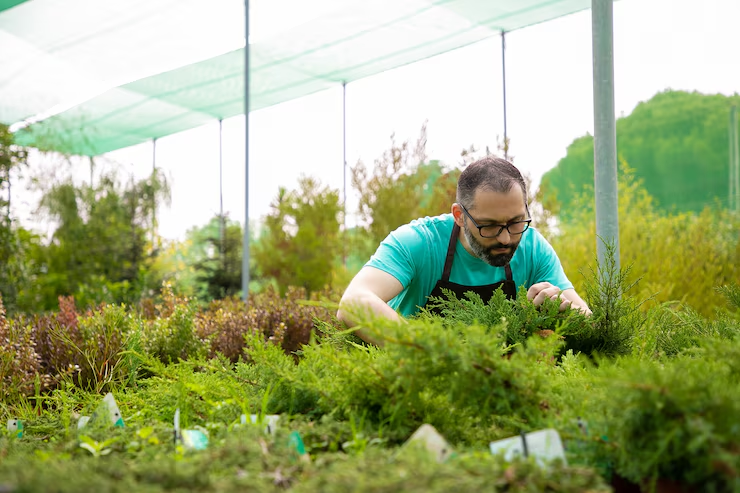Introduction
The practice of sustainable agriculture has become an essential requirement. The increasing environmental challenges, coupled with the depletion of natural resources and rising global food demand, require farmers across the world to embrace sustainable farming techniques. This guide examines agricultural methods combining innovation with sustainability to boost farmer productivity while safeguarding environmental health.
From precision farming to organic techniques, we’ll delve into methods that ensure long-term agricultural success. Additionally, we’ll highlight how industry leaders like CMS Industries, a trusted Agricultural Products Manufacturer and Supplier, contribute to sustainable farming by providing high-quality agricultural solutions.
Our discussion about sustainable agriculture extends beyond the concept of just one farming system. A variety of farming techniques maintain soil structure and natural resource health while enhancing productive systems, which represent regenerative agriculture.
The true meaning of sustainable agriculture involves the use of farming methods that preserve soil health while implementing crop rotations and reducing chemical inputs. Sustainable agricultural practices involve methods that protect soil health through crop rotations while minimizing chemical input dependency.
Now we will explore sustainable urban agricultural practices worldwide and present examples from Europe to South America. Our first stop? Europe.
Why Sustainable Agriculture Matters
Sustainable agriculture focuses on meeting current food needs without compromising future generations. Here’s why it’s crucial:
- Environmental Protection: Reduces soil degradation, water pollution, and greenhouse gas emissions.
- Economic Viability: Lowers input costs and increases farm profitability.
- Social Responsibility: Ensures fair labor practices and supports rural communities.
With climate change threatening traditional farming, sustainability is the key to resilience.
Sustainable agriculture protects the planet by conserving natural resources and reducing agriculture’s environmental damage. Sustainable farming practices encompass crop rotation techniques while minimizing synthetic fertilizers and pesticides to support biodiversity enhancement. The adoption of these practices leads to better soil health and higher yields while cutting carbon emissions through significant soil carbon storage.
Sustainable agriculture strengthens farmer livelihoods through enduring economic returns and future generations’ food security. Sustainable agriculture stands as an essential practice because it enables agriculture to function as a planetary solution instead of becoming an environmental issue.
Read More: Top Agricultural Products Supplier in India
The many Benefits of Agriculture
Economic benefits
Agriculture generates substantial economic advantages that affect both local communities and the international stage. The agricultural sector plays a vital role in the global economy through its provision of employment opportunities and essential raw materials and food resources. Rural development and poverty reduction occur through agriculture because it generates income for farmers and their families. The export of agricultural products generates revenue for countries through the agricultural sector. Sustainable agriculture practices yield economic advantages by cutting input expenses and boosting crop production to generate greater profits for farmers.
Social benefits
Rural areas receive substantial social benefits from agricultural practices. Employment opportunities generated by agriculture help people achieve better living standards and diminish poverty. The agricultural sector generates food and nutritional products that play a crucial role in sustaining human health and well-being. Traditional farming practices are maintained through agriculture, while community participation experiences enhancement. Environmental education opportunities emerge from sustainable agricultural practices, while such methods support gender equality and women farmer empowerment.
Environmental benefits
The environment can greatly benefit from agriculture when it follows sustainable practices. Sustainable farming methods help protect water and soil resources while supporting biodiversity. The practice of crop rotation enhances soil health and lessens dependence on synthetic fertilizers that contribute to waterway pollution. Agroforestry practices help decrease deforestation while simultaneously enhancing soil quality and capturing atmospheric carbon. Sustainable agriculture lowers greenhouse gas emissions through the adoption of renewable energy sources alongside reduced synthetic fertiliser use. Sustainable agricultural practices work to neutralize agriculture’s harmful effects on nature and ensure a healthier planet.
The soil’s capacity to store carbon stands as one of its environmental benefits. Soil carbon sequestration takes carbon dioxide out of the atmosphere and places it into the ground. Sustainable agriculture promotes soil organic matter development through practices that include reduced tillage operations, cover crop planting and livestock grazing systems. These practices boost soil health and fertility, which leads to the growth of diverse plant species and consequently increases carbon storage capacity in the soil. The promotion of sustainable agricultural practices creates a stronger and more efficient agricultural system.
Key Sustainable Agriculture Solutions for Farmers
1. Precision Farming: Technology-Driven Efficiency
Precision farming uses AI, IoT, and GPS to optimize crop yields while minimizing waste. Key technologies include:
- Soil Sensors: Monitor moisture and nutrient levels.
- Drones: Assess crop health and detect pests early.
- Automated Irrigation: Reduces water wastage.
Farmers using precision techniques report higher productivity with fewer resources.
2. Organic Farming: Chemical-Free Cultivation
Organic farming eliminates synthetic pesticides and fertilizers, relying instead on:
- Composting: Enhances soil fertility naturally.
- Crop Rotation: Prevents soil depletion.
- Biological Pest Control: Uses natural predators instead of chemicals.
Brands like CMS Industries support organic farming by supplying eco-friendly agricultural products.
3. Agroforestry: Integrating Trees and Crops
Agroforestry combines agriculture with tree cultivation, offering benefits like:
- Improved Biodiversity: Trees provide habitats for beneficial insects.
- Carbon Sequestration: Helps combat climate change.
- Additional Income: Farmers can sell timber or fruits from trees.
4. Hydroponics and Vertical Farming: Space-Saving Solutions
Urban and small-scale farmers are turning to:
- Hydroponics: Soil-less farming using nutrient-rich water.
- Vertical Farming: Maximizes space by growing crops in stacked layers.
These methods reduce land use and water consumption significantly.
5. Conservation Tillage: Protecting Soil Health
Traditional tilling disrupts soil structure, leading to erosion. Conservation tillage minimizes soil disturbance by:
- No-Till Farming: Leaves crop residues to enrich the soil.
- Reduced Tillage: Limits plowing to preserve moisture.
This technique enhances soil fertility and reduces fuel costs.
Read More: Finding the Best Farming Equipment Suppliers
How CMS Industries Supports Sustainable Farming
As a leading Agricultural Products Supplier, CMS Industries plays a vital role in promoting sustainable agriculture. They offer:
- Eco-Friendly Fertilizers: Organic and bio-based options.
- Efficient Irrigation Systems: Water-saving solutions.
- High-Quality Farm Equipment: Durable and energy-efficient tools.
Their commitment to sustainability helps farmers transition to greener practices seamlessly.
Challenges in Adopting Sustainable Agriculture
Despite its benefits, farmers face hurdles like:
- High Initial Costs: Advanced tech and organic inputs can be expensive.
- Lack of Knowledge: Training is needed for new techniques.
- Market Access: Organic produce often requires certification.
Governments and NGOs must provide subsidies and education to encourage adoption.
Future of Sustainable Farming
The future lies in:
- AI and Big Data: Predictive analytics for better crop management.
- Regenerative Agriculture: Restores ecosystems while farming.
- Circular Farming: Zero-waste agricultural models.
With continuous innovation, sustainable farming will dominate global agriculture.
Conclusion
Sustainable agriculture is the pathway to food security and environmental conservation. By adopting precision farming, organic practices, and efficient resource management, farmers can thrive while protecting the planet. Companies like CMS Industries further support this mission by supplying sustainable agricultural products.
The shift to eco-friendly farming isn’t just a trend—it’s a necessity for a greener future.
Frequently Asked Questions
1. What is sustainable agriculture, and why is it important?
Sustainable agriculture refers to farming practices that protect the environment, support economic profitability, and promote social equity. It minimizes chemical use, conserves water, and maintains soil health. It’s crucial because it ensures long-term food security, reduces climate change impact, and supports farmers’ livelihoods without depleting natural resources.
2. How does precision farming benefit small-scale farmers?
Precision farming uses technology like drones, sensors, and AI to optimize crop yields with minimal waste. Small farmers benefit by reducing input costs (water, fertilizers) and increasing productivity. Real-time data helps in better decision-making, leading to higher profits while conserving resources, making it a cost-effective solution for sustainable farming.
3. Can organic farming produce yields comparable to conventional farming?
Yes, organic farming can match conventional yields over time, especially with proper techniques like crop rotation and composting. While initial yields may be lower, soil health improves, leading to sustainable productivity. Studies show organic farms are more resilient to droughts and pests, ensuring stable long-term output.
4. What role does CMS Industries play in sustainable agriculture?
CMS Industries, a leading Agricultural Products Manufacturer & Supplier, supports sustainable farming by providing eco-friendly fertilizers, efficient irrigation systems, and durable farm equipment. Their solutions help farmers reduce chemical dependency, conserve water, and adopt greener practices, contributing to environmentally responsible agriculture.
5. What are the biggest challenges in transitioning to sustainable farming?
The main challenges include high initial costs for organic inputs and technology, lack of training in sustainable methods, and limited market access for eco-friendly produce. Government subsidies, farmer education programs, and certification support can help overcome these barriers and encourage wider adoption of sustainable agriculture.





